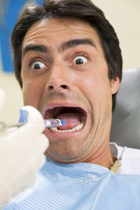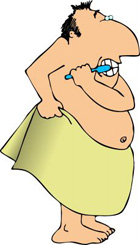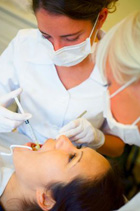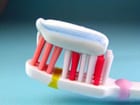Fear is something we all have to deal with in life, whether it be fear of spiders, commitment or even flying, it is something we need to conquer in order to enjoy life to its fullest. However, some fears can do more than stop us doing this. Dental phobia can seriously affect the health of your teeth and cause painful and expansive dental problems that can last for a whole lifetime.
Dental phobia is one of the most common fears in the UK and comes in a variety of degrees of severity. Most people who fear the dentist, as many as nine out of ten according to some surveys, are able to put their fears to  one side in order to receive necessary treatment. But for others the fear is simply too great to overcome and they will avoid any kind of contact with the dentist at all cost. This leads to a downward spiral of dental health as the longer without treatment the more the patients requires it.
one side in order to receive necessary treatment. But for others the fear is simply too great to overcome and they will avoid any kind of contact with the dentist at all cost. This leads to a downward spiral of dental health as the longer without treatment the more the patients requires it.
Dental phobia can be overcome with the right help. It is particularly down to the dentist to help patients overcome fears, as many cases of dental phobia are caused by traumatic experiences at the dentist in the past. Talking through your fears with a friendly City of Leeds dentist can help many people to realise there is nothing to fear. Other treatments for phobia include using hypnotherapy and self-hypnotherapy techniques in order to relax before appointments. Recent studies have also had a lot of success with using lavender oil and other aromatherapy treatments.
Some techniques may work for some better than others but it is vitally important that patients who do fear the dentist try with help to overcome their fears and get the right dental treatment.





 Dental implants are the most realistic way to restore a missing tooth as they replace the whole tooth including the root. Unlike some other dental restorations like partial dentures and dental bridges, which although are more affordable, do not offer the same degree of anxiety-free results.
Dental implants are the most realistic way to restore a missing tooth as they replace the whole tooth including the root. Unlike some other dental restorations like partial dentures and dental bridges, which although are more affordable, do not offer the same degree of anxiety-free results. Looking after your teeth really doesn’t take much effort when you consider the consequences of not doing it properly, yet so many of us fall short of the recommended standards of cleaning. It is very easy when it comes to our teeth to assume that they are fine because they are causing no immediate problems, but this can be very deceptive and dangerous.
Looking after your teeth really doesn’t take much effort when you consider the consequences of not doing it properly, yet so many of us fall short of the recommended standards of cleaning. It is very easy when it comes to our teeth to assume that they are fine because they are causing no immediate problems, but this can be very deceptive and dangerous. Veneers can have one of the most dramatic effects on the appearance of teeth. Modern porcelain veneers are incredibly lifelike and completely transform the appearance of damaged teeth. Modern veneer technology is also making the design and fitting of veneers significantly easier and less time consuming. It is also reducing the levels of discomfort the patient may experience during the treatment.
Veneers can have one of the most dramatic effects on the appearance of teeth. Modern porcelain veneers are incredibly lifelike and completely transform the appearance of damaged teeth. Modern veneer technology is also making the design and fitting of veneers significantly easier and less time consuming. It is also reducing the levels of discomfort the patient may experience during the treatment. This can be the cause of significant pain in the mouth as when the pulp expands it puts a lot of pressure on the dental nerve. The pain can be so severe that patients often have difficulty pinpointing exactly where it is coming from as it may feel like several surrounding teeth are also in pain. Because the dentine and enamel that surround the pulp and nerve are more solid and no flexible, the inflamed and expanded pulp has nowhere to go. This can make it very difficult to treat before necrosis, or the death of the live part of the tooth, occurs.
This can be the cause of significant pain in the mouth as when the pulp expands it puts a lot of pressure on the dental nerve. The pain can be so severe that patients often have difficulty pinpointing exactly where it is coming from as it may feel like several surrounding teeth are also in pain. Because the dentine and enamel that surround the pulp and nerve are more solid and no flexible, the inflamed and expanded pulp has nowhere to go. This can make it very difficult to treat before necrosis, or the death of the live part of the tooth, occurs. It is all too easy to get complacent when it comes to your teeth. One or two all clear appointments and a lack of any pain or noticeable difficulty can lead to several years of missed six-monthly check-ups and then all of a sudden it can be too late and you’ve lost a tooth to decay.
It is all too easy to get complacent when it comes to your teeth. One or two all clear appointments and a lack of any pain or noticeable difficulty can lead to several years of missed six-monthly check-ups and then all of a sudden it can be too late and you’ve lost a tooth to decay. Fluoride is an element that naturally occurs in both water and food and has a beneficial impact on the teeth. So much so, that for the last eighty years or so we have been adding it to drinking water as a preventative measure against tooth decay. As well as this there is also a range of fluoride toothpastes and supplements that people use in areas of low fluoridation of the water.
Fluoride is an element that naturally occurs in both water and food and has a beneficial impact on the teeth. So much so, that for the last eighty years or so we have been adding it to drinking water as a preventative measure against tooth decay. As well as this there is also a range of fluoride toothpastes and supplements that people use in areas of low fluoridation of the water. One of the most serious oral conditions that can occur is oral cancer. The survival rate for oral cancer if diagnosed early is quite high but it can be fatal in cases where it is not spotted soon enough and allowed to develop. The dentist plays a crucial part in spotting the first signs and symptoms of oral cancer, which include small white and red patches on the soft tissue that don’t go away naturally.
One of the most serious oral conditions that can occur is oral cancer. The survival rate for oral cancer if diagnosed early is quite high but it can be fatal in cases where it is not spotted soon enough and allowed to develop. The dentist plays a crucial part in spotting the first signs and symptoms of oral cancer, which include small white and red patches on the soft tissue that don’t go away naturally. Tooth decay and gum disease are still a major problem in the UK thanks to poor diet and insufficient standards of oral hygiene. While many people do not see their dental health as all that important, decay and disease can have significant consequences for your overall health.
Tooth decay and gum disease are still a major problem in the UK thanks to poor diet and insufficient standards of oral hygiene. While many people do not see their dental health as all that important, decay and disease can have significant consequences for your overall health. Teeth grinding, otherwise known as bruxism, on an occasional basis will cause no damage to your teeth. But continual or repeated teeth grinding may start to become a serious problem as it can erode the enamel, cause structural damage to teeth and cause painful jaw complaints. Excessive teeth grinding becomes even more of a serious problem if it occurs during sleep. This is because the patient will have no control over their actions and you can imagine the rate of erosion if someone spends several hours a night grinding their teeth.
Teeth grinding, otherwise known as bruxism, on an occasional basis will cause no damage to your teeth. But continual or repeated teeth grinding may start to become a serious problem as it can erode the enamel, cause structural damage to teeth and cause painful jaw complaints. Excessive teeth grinding becomes even more of a serious problem if it occurs during sleep. This is because the patient will have no control over their actions and you can imagine the rate of erosion if someone spends several hours a night grinding their teeth.

